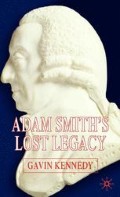Abstract
Whatever amount is spent by the State on carrying out its three main duties it has to be raised by one means or another with ‘the people contributing a part of their own private revenue in order to make up a publick revenue to the sovereign or commonwealth’.1 In the absence of an independently wealthy sovereign, a feature of monarchy long since absent in Britain, taxation from the private revenues of the people was the main source of government revenue. Smith did not think much of the commercial prowess of sovereigns — and thought even less of the prowess of merchants, instancing those of the East India Company for particular contempt as they were ‘bad traders’ and ‘bad sovereigns’.2
Access this chapter
Tax calculation will be finalised at checkout
Purchases are for personal use only
Author information
Authors and Affiliations
Copyright information
© 2005 Gavin Kennedy
About this chapter
Cite this chapter
Kennedy, G. (2005). Public Revenues. In: Adam Smith’s Lost Legacy. Palgrave Macmillan, London. https://doi.org/10.1057/9780230511194_55
Download citation
DOI: https://doi.org/10.1057/9780230511194_55
Publisher Name: Palgrave Macmillan, London
Print ISBN: 978-1-349-52484-6
Online ISBN: 978-0-230-51119-4
eBook Packages: Palgrave Economics & Finance CollectionEconomics and Finance (R0)

